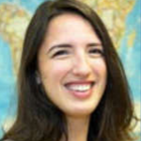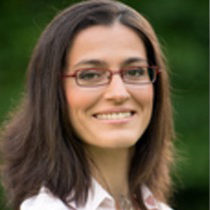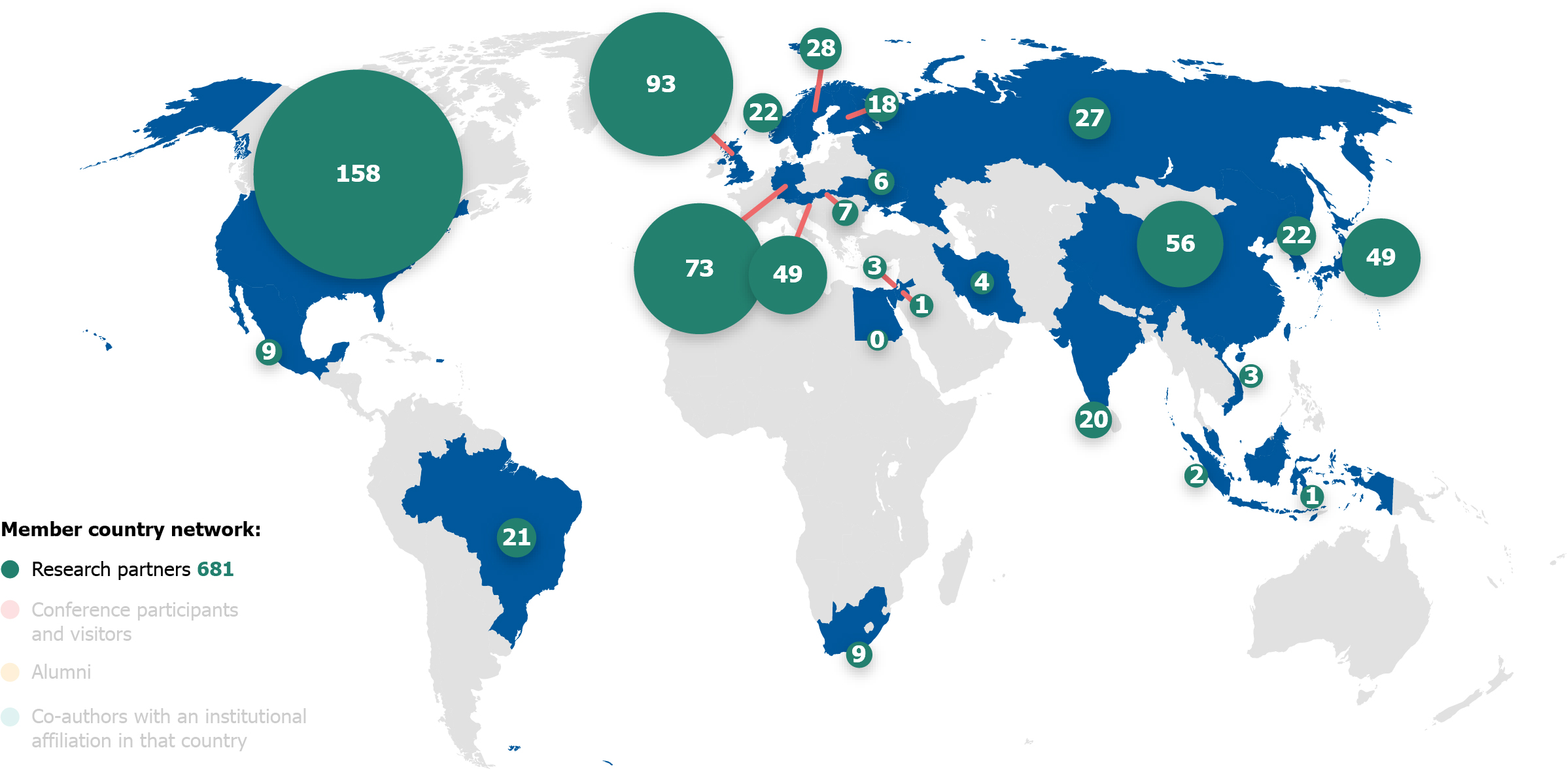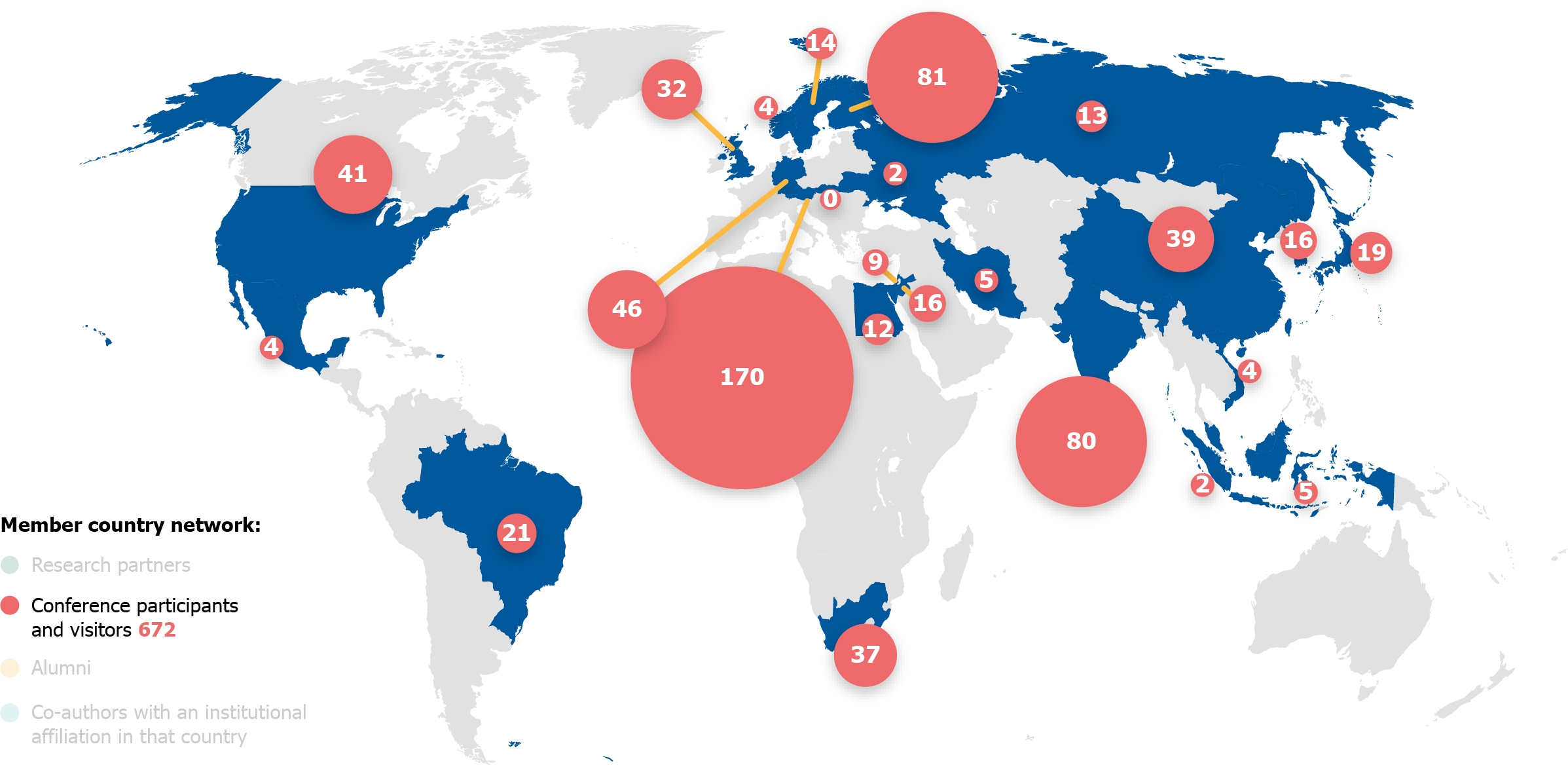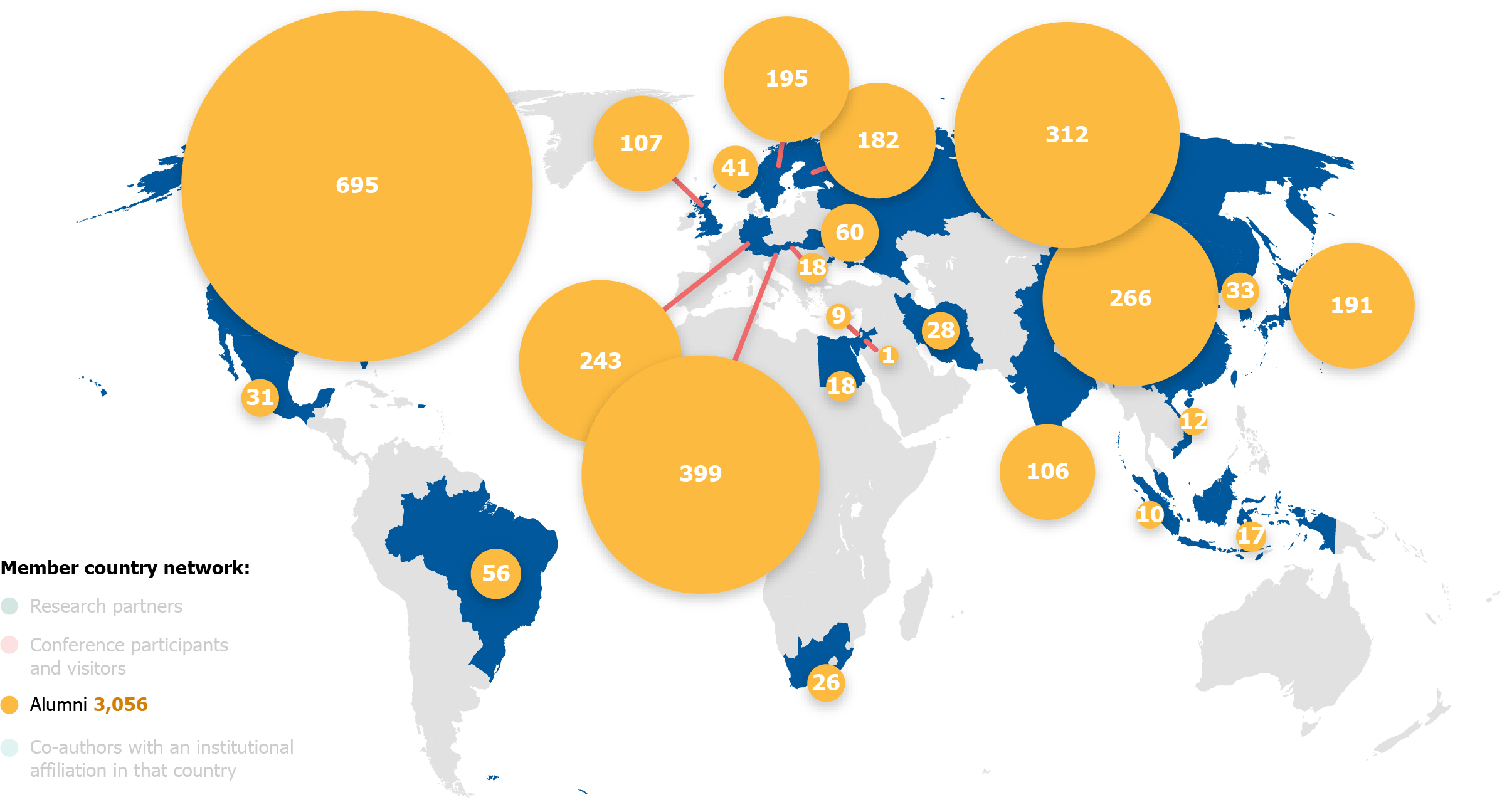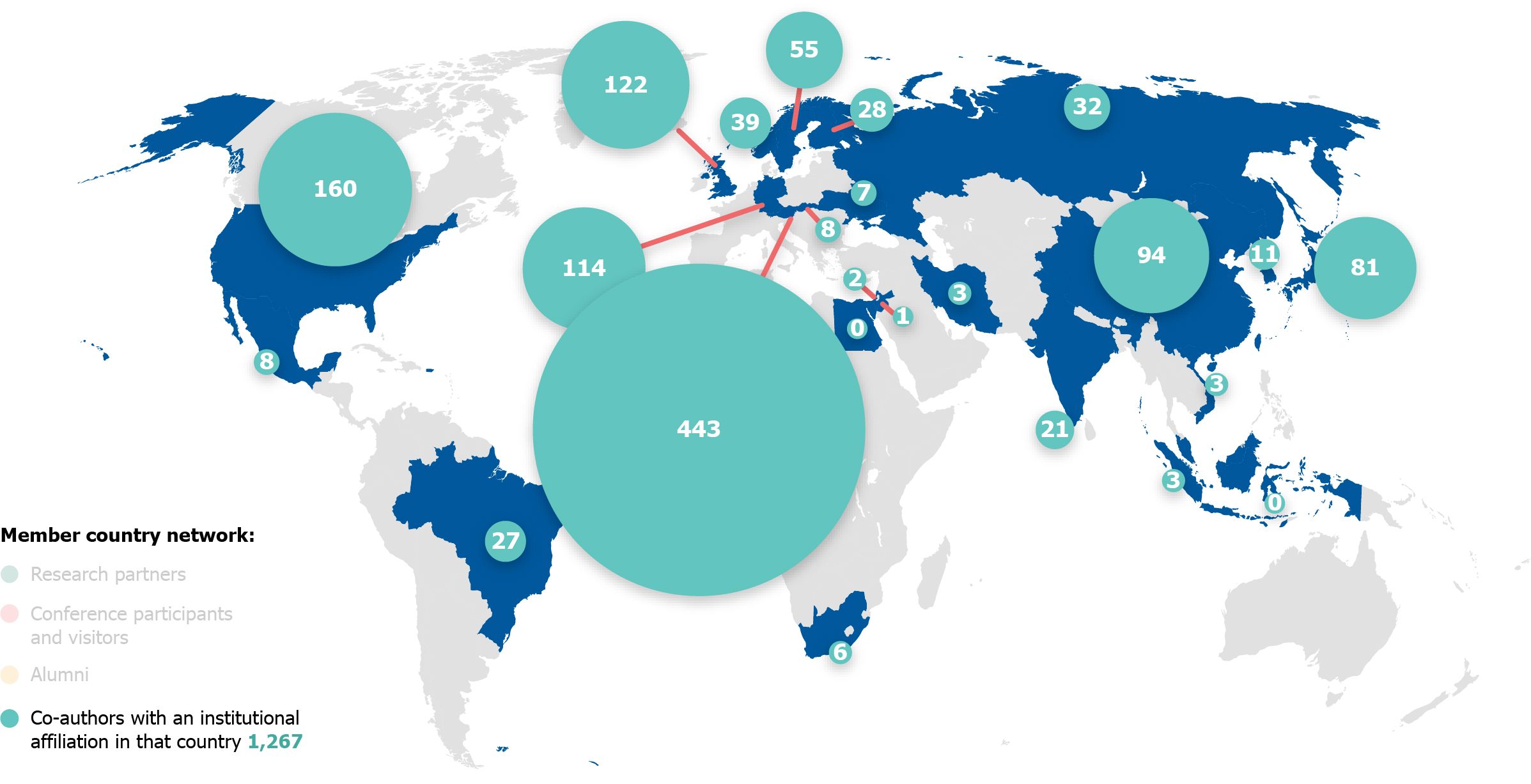Network and collaborators
research partners in member countries
advisory boards and steering committees that include IIASA researchers
externally funded projects where IIASA was lead or partner
alumni from 100 countries
Science diplomacy
In September 2020, IIASA organized a session on science diplomacy at the EuroScience Open Forum (ESOF2020). The session aimed to introduce the Big Research Infrastructures for Diplomacy and Global Engagement through Science (BRIDGES) network to the wider science diplomacy community and to discuss emerging issues. Among the speakers at the session were the Director General of IIASA, the Director of The Abdus Salam International Centre for Theoretical Physics (ICTP), representatives of the European Molecular Biology Laboratory (EMBL), the European Commission Joint Research Centre (JRC), and the European Organization for Nuclear Research (CERN).
In November 2020 IIASA, in its capacity as secretariat of the BRIDGES network, organized a virtual Third BRIDGES Meeting. Representative of the European Southern Observatory (ESO) participated in the meeting for the first time, thus bringing the number of BRIDGES members to twelve. The current members are: ICTP, JRC, EMBL, CERN, the European Southern Observatory (ESO), the European Space Agency (ESA), European XFEL GmbH, IIASA, the International Thermonuclear Experimental Reactor (ITER) Organization, The World Academy of Sciences (TWAS), the Square Kilometre Array Organisation (SKAO), and Synchrotron-light for Experimental Science and Applications in the Middle East (SESAME). Among the topics discussed during the meeting were the readiness, willingness, and preparedness of the scientific community to actively engage in building bridges between policy, science, and diplomacy, as well as policies on open access to scientific knowledge. The meeting helped to identify ways on how to move forward.
Conference participants, visitors, and research partners
Despite the restrictions brought about by the COVID19 pandemic, 98 visitors came to IIASA to do research, collaborate with the institute’s research programs, and attend IIASA events. Of these visitors, 79 were from member countries.
IIASA scientists hosted or coordinated 74 events worldwide. The majority of these events took place virtually due to the COVID-19 pandemic. The events were attended by a total of 1,218 participants, of which 593 were identified as coming from member countries.
The IIASA global research network of over 680 partner institutes in NMO countries facilitates greater scientific cooperation.
Alumni
IIASA has 4,337 alumni from 100 countries, of whom 25% are actively involved in the institute’s scientific activities and many are leaders in academia, government, and the private sector. The Alumni Association coordinates exchange within this network.
In 2020, former YSSPer and alumna Leila Niamir joined the Global Young Academy, which empowers young researchers to lead international, interdisciplinary, and inter-generational dialogue with the goal to make global decision making evidence-based and inclusive.
Researcher mobility
International research collaborations underpin IIASA work. Apart from the high-quality research output and the subsequent impact of the research projects’ findings, these research collaborations benefit IIASA member countries by improving the skills and expertise of its researchers. Working with IIASA gives a country’s researchers access to complementary knowledge, new perspectives, new methodologies, new data, new partnerships, and new sources of funding.
The institute provides a range of incentives, as well as structures, for international research collaboration and encourages the mobility of global scientific talent. As IIASA gives preference to researchers from its member countries in research and capacity-building activities, membership of IIASA provides many new opportunities for scientists at all career levels.
 Samir K.C. was a researcher with the IIASA World Population Program and a professor at the Asian Demographic Research Centre, Shanghai University, China.
Samir K.C. was a researcher with the IIASA World Population Program and a professor at the Asian Demographic Research Centre, Shanghai University, China.
 Junko Mochizuki was a researcher with the IIASA Risk and Resilience and Water programs and a Disaster Risk Management Specialist at the World Bank.
Junko Mochizuki was a researcher with the IIASA Risk and Resilience and Water programs and a Disaster Risk Management Specialist at the World Bank.
Strategic partnerships and collaborations
In 2020, IIASA continued to prioritize partnerships with research collaborators and research users in its 22 member countries. These partnerships include formal collaborations between institutions as co-investigators on externally funded research projects, and informal cooperation between individual researchers working together on scientific publications.
The focus of IIASA research on finding solutions to challenges that cross international boundaries results in strategic collaboration with a range of international and regional organizations. New collaborations in 2020 included:
- A new partnership with the International Science Council that brought together over 200 thought leaders to define and design sustainability pathways that will enable building a more sustainable post-COVID-19 world.
- The start of a strategic partnership with SAS Institute Inc., the multinational developer of analytics software, to implement the next generation of crowd-driven artificial intelligence (AI) to help power AI algorithms in order to better track deforestation.
- Membership of Africa-UniNet, a research network to create a long-term, stable basis for international scientific cooperation between African universities and research institutions, and those based in Austria.
- A joint call with the Russian Foundation for Basic Research for collaborative research projects on pandemics.
In addition, IIASA signed Memoranda of Understanding with 17 organizations to facilitate research collaborations and the use of IIASA research by institutions in a number of countries, including Austria, Brazil, China, India, Russia, the UK, and the US, along with international organizations such as the United Nations Convention to Combat Desertification (UNCCD). In 2020, IIASA also became a founding partner of an initiative to organize the International Year of Basic Sciences for Sustainable Development in 2022 and to have it proclaimed as such by the UN General Assembly.
Established strategic partnerships were also progressed in 2020. Among these were:
- A joint report by IIASA and the Organisation for Economic Co-operation and Development (OECD) was published in February. The report demonstrated that putting systemic thinking at the centre of policymaking is essential to addressing global issues in an era of rapid and disruptive change.
- A four-year project led jointly by the Global Environment Facility (GEF), the United Nations Industrial Development Organization (UNIDO), and IIASA achieved its objectives in 2020. The The study established partnerships with stakeholders in the Indus and Zambezi basins to develop an integrated assessment modeling tool that can be used to identify long-term cost-effective solutions to meet water, energy, and land development goals in an integrated manner.
- A third report was released by the IIASA-led consortium, The World in 2050 initiative, on innovations for sustainability and pathways to an efficient and sufficient post-pandemic future at the United Nation’s High-level Political Forum on Sustainable Development in July.
Contributions to global endeavors
In 2020, IIASA researchers served on 224 advisory boards and steering committees. These ranged from the World Health Organization’s (WHO) Air Pollution and Health Scientific Advisory Group to the International Boreal Forest Research Association and the World Water Council. A total of 20 IIASA researchers contributed to the Intergovernmental Panel on Climate Change’s (IPCC) Sixth Assessment Report, which is currently under preparation and scheduled to be finalized in 2021. Notably, IIASA emeritus research scholar Nebojsa Nakicenovic was appointed to the Group of Chief Scientific Advisors to the European Commission.
IIASA has consultative status with a range of intergovernmental organizations, which facilitates their uptake of IIASA research. These include the United Nations Economic and Social Council (Consultative status: category I), United Nations Framework Convention on Climate Change (Observer), and United Nations Environment Programme (Observer).
In addition, IIASA researchers made research contributions to the global programs of multiple international organizations. For example, a World Bank report on tackling the growing challenge of urban air pollution, a Department of Economic and Social Affairs of the United Nations (UNDESA) report on effective institutions to support sustainable development, and a United Nations Economic Commission for Europe (UNECE) report on accelerating the energy transition in the UNECE Region—all used IIASA research

